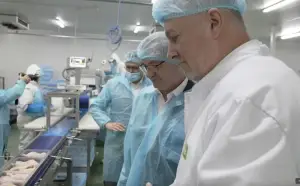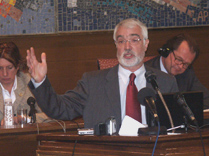- Serbia
Get to know Serbia
- Citizens
Culture and science
Health services
Pension and disability insurance
- Business
Employment
Economy
- Media
- Government
- Contact
Keep in touch
Contact form
Back
Keepin touch
Whether you have a question, comment, suggestion or any problem in the purview of the government, send us your message and we will try to respond as soon as possible. If your problem is not in our purview, we will forward your message to the relevant institution.
Q:
A:
Eight tenders for large enterprises to be called by end-2004
Belgrade,
16 November 2004
Serbian Deputy Prime Minister Miroljub Labus said today that reforms in Serbia-Montenegro, which were brought to a standstill in the first half of the year, have continued in the second half of 2004 but the European Bank for Reconstruction and Development (EBRD) did not take that into account when compiling its annual transition report.
Labus said at the presentation of the EBRD’s 2004 transition report on Serbia-Montenegro that the slow growth is not a political problem but rather a result of the lack of readiness to enter the second stage of structural and institutional reforms.
According to him, the first stage of transition, which includes auction sales, was graded 3.5 out of 4.3, while the second stage, which involves tenders, structural reform, and corporate management, received a low grade (below two points).
Labus said that Serbia needs political stability, which brings much lower interest rates. Current interest rates in the country are so high that they hinder economic growth. They are the result from high political risk, according to Labus.
He announced that another eight large enterprises will be offered at tenders by the end of the year, as well as five out of 67 large firms that are currently restructuring.
Labus also said that the state must consolidate the debts of large public enterprises, such as power utility EPS and oil company NIS, since with their current liabilities, it will be hard to find buyers for them.
According to him, corporate management, which has also stagnated in the past three years, will be reformed after the new law on receivership comes into force.
He also said that subsidies to loss-making firms will be reduced by the end of the year and over the next year.
Labus added that the banking sector deserves a better grade from the EBRD since it has issued around two million payment cards even though some 10 percent of the population is living on the verge of poverty. He announced that three domestic banks will be privatised by the end of the year, plus a further four in 2005.
He also said that the country’s current account deficit is not sustainable in the long term and that it will be overcome though export-oriented production. Labus added that Serbia will continue with tender sales and the harmonisation of privatisation regulations in 2005 as well as with the privatisation of state equity, which he said is a pre-requisite for the development of a stock exchange.
According to him, the first stage of transition, which includes auction sales, was graded 3.5 out of 4.3, while the second stage, which involves tenders, structural reform, and corporate management, received a low grade (below two points).
Labus said that Serbia needs political stability, which brings much lower interest rates. Current interest rates in the country are so high that they hinder economic growth. They are the result from high political risk, according to Labus.
He announced that another eight large enterprises will be offered at tenders by the end of the year, as well as five out of 67 large firms that are currently restructuring.
Labus also said that the state must consolidate the debts of large public enterprises, such as power utility EPS and oil company NIS, since with their current liabilities, it will be hard to find buyers for them.
According to him, corporate management, which has also stagnated in the past three years, will be reformed after the new law on receivership comes into force.
He also said that subsidies to loss-making firms will be reduced by the end of the year and over the next year.
Labus added that the banking sector deserves a better grade from the EBRD since it has issued around two million payment cards even though some 10 percent of the population is living on the verge of poverty. He announced that three domestic banks will be privatised by the end of the year, plus a further four in 2005.
He also said that the country’s current account deficit is not sustainable in the long term and that it will be overcome though export-oriented production. Labus added that Serbia will continue with tender sales and the harmonisation of privatisation regulations in 2005 as well as with the privatisation of state equity, which he said is a pre-requisite for the development of a stock exchange.
-
 Belgrade, 22 November 2025
Belgrade, 22 November 2025"Wine Vision by Open Balkan” international fair opened
-
 Belgrade, 27 October 2025
Belgrade, 27 October 2025Construction of Selova dam of vital importance for southeast Serbia
-
 Belgrade, 22 October 2025
Belgrade, 22 October 2025First 19 resolutions awarded under IPARD III for procurement of new tractors
-
 Šid, 21 October 2025
Šid, 21 October 2025Superior Foods example of successful Serbia-Hungary cooperation
-
 Belgrade/Washington, 17 October 2025
Belgrade/Washington, 17 October 2025Confirmation of Serbia’s position as attractive investment destination
-
 Belgrade/Washington, 16 October 2025
Belgrade/Washington, 16 October 2025Serbian economy maintains stability amid global challenges
-
 Sombor, 14 October 2025
Sombor, 14 October 2025Agriculture one of major pillars of bilateral cooperation with Italy
-
 Belgrade, 13 October 2025
Belgrade, 13 October 2025First IPARD III resolutions on support to farmers presented
-
 Belgrade, 21 September 2025
Belgrade, 21 September 2025Solution for legalisation of 4.8 million properties by year’s end
-
 Belgrade, 19 September 2025
Belgrade, 19 September 2025Strong potential for Italian investments in Serbia’s processing sector


